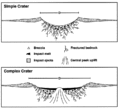Robert S. Dietz
Robert Sinclair Dietz (September 14, 1914 – May 19, 1995) was a scientist with the US Coast and Geodetic Survey. Dietz was a marine geologist, geophysicist and oceanographer who conducted pioneering research along with Harry Hammond Hess concerning seafloor spreading, published as early as 1960–1961. While at the Scripps Institution of Oceanography he observed the nature of the Emperor chain of seamounts that extended from the northwest end of the Hawaiian Island–Midway chain and speculated over lunch with Robert Fisher in 1953 that something must be carrying these old volcanic mountains northward like a conveyor belt.[1]
In later work he became interested in meteorite impacts, was the first to recognize the Sudbury Basin as an ancient impact event, and discovered a number of other impact craters.[2] He championed the use of shatter cones as evidence for ancient impact structures. He received the Walter H. Bucher Medal from the American Geophysical Union in 1971, the Barringer Medal from the Meteoritical Society in 1985 and the Penrose Medal from the Geological Society of America in 1988.
Dietz was an outspoken critic of creationism, and was the faculty advisor of two student groups at Arizona State University in 1985, Americans Promoting Evolution Science (APES) and the Phoenix Skeptics. Dietz spoke on evolution and creationism at meetings of these groups,[3] and debated creationist Walter Brown and Christian apologist William Lane Craig at Arizona State University.
Robert S. Dietz lectures
The ASU School of Earth and Space Exploration sponsors annual Robert S. Dietz Memorial Public Lectures, which have been given by:
- 2006 National Center for Science Education Executive Director Eugenie Scott[4]
- 2007 NASA Astronaut John M. Grumsfeld[5]
- 2011 John Grotzinger, Caltech[6]
Selected publications
- Dietz, Robert S. (1994). "Earth, Sea, and Sky: Life and Times of a Journeyman Geologist". Annual Review of Earth and Planetary Sciences 22: 1–32. Bibcode:1994AREPS..22....1D. doi:10.1146/annurev.ea.22.050194.000245.
- Dietz, Robert S.; John C. Holden (scientific illustrator) (1987). Creation/Evolution Satiricon: Creationism Bashed. Winthrop, WA: Bookmaker.
- Dietz, Robert S. (Nov.-Dec. 1983). "In Defense of Drift". The Sciences 23: 26.
- Dietz, Robert S. (1964). Sudbury Structure as an Astrobleme. University of Chicago.
- Dietz, Robert S. (3 June 1961). "Continent and Ocean Basin Evolution by Spreading of the Sea Floor". Nature 190 (4779): 854–857. Bibcode:1961Natur.190..854D. doi:10.1038/190854a0.
- Dietz, Robert S. (1954). "Marine geology of northwestern Pacific: description of Japanese bathymetric chart 6901". Bull. Geol. Soc. Amer. 65 (12): 1199. Bibcode:1954GSAB...65.1199D. doi:10.1130/0016-7606(1954)65[1199:MGONPD]2.0.CO;2. ISSN 0016-7606.
- Menard, Henry W.; Dietz, Robert S. (May 1952). "Mendocino submarine escarpment". Journal of Geology 60 (3): 266–278. Bibcode:1952JG.....60..266M. doi:10.1086/625962. JSTOR 30058194.
References
- ↑ Scripps Institution of Oceanography. "Robert Sinclair Dietz Biography". Retrieved September 2011.
- ↑ Bourgeois, J.; Koppes, S. (1998). "Robert S. Dietz and the identification of impact structures on Earth". Earth Sciences History 17 (2): 139–156.
- ↑ "January Meeting," Phoenix Skeptics News vol. 1, no. 4, January/February 1988. "Meeting Announcement," The Arizona Skeptic vol. 3, no. 2, February/March 1990.
- ↑ "Eugenie Scott gives the Robert S. Dietz memorial lecture," The Lippard Blog, February 3, 2006
- ↑ 2007 Robert S. Dietz Memorial Public Lecture
- ↑ 2011 Robert S. Dietz Memorial Lecture
Bibliography
- "Dietz, Robert Sinclair". McGraw-Hill Modern Scientists and Engineers 1. 1980. pp. 290–291.
External links
|

